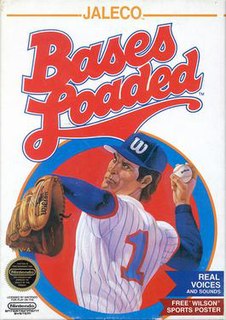 W
WBases Loaded, known in Japan as Moero!! Pro Yakyuu , is a baseball video game by Jaleco that was originally released in Japan for the arcades. A version for the Nintendo Entertainment System was released in 1987 in Japan and in 1988 in North America, and a Game Boy port was released in July of 1990. A mobile phone version exists as well. For the Virtual Console, Bases Loaded was released on September 11, 2007 in Japan and on April 7, 2008 in North America for the Wii, at the cost of 500 Wii Points and on May 15, 2013 in Japan and on July 10, 2014 in North America for Nintendo 3DS. The Wii U version in North America was also released at the same time as the Nintendo 3DS version. A port by Mebius and Clarice Games for the PlayStation 4 has been announced for a Q4 2015 release in Japan.
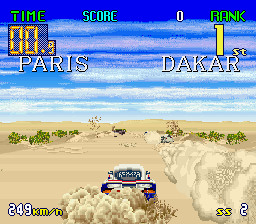 W
WBig Run (ビッグラン) is a 3D rally racing arcade game released by Jaleco in 1989. The game is the first to be set in the Paris-Dakar rally raid which the player drives a Porsche 959, resembling that of the 1986 winner. Opponents in the game seem to resemble the Peugeot 205 T16, which went on to win in the 1987 Paris-Dakar rally, with Mitsubishi Pajeros also appears occasionally.
 W
WExerion is a video game developed and published by Jaleco. It was released in arcades on February 1983 and licensed to Taito for manufacture and distribution of the game in North America. The player controls a starship and must fire at enemies on the screen while avoiding projectiles. The game uses a pseudo-3D scrolling background, giving a sense of depth, and the player's ship has a sense of inertia while it is being controlled with the joystick.
 W
WField Combat is a 1985 arcade video game in which the player fights as a single commanding officer in a generic futuristic battlefield. The Family Computer version of Field Combat was later released for the Wii's Virtual Console service exclusively in Japan on June 12, 2007. A sequel game, Field Combat DX, was released for Japanese mobile phones in 2004.
 W
WFortified Zone, known in Japan as Ikari no Yōsai is a 1991 video game developed and published by Jaleco for the Game Boy. It was first released in Japan on February 26, 1991 and later released in North America in September 1991. It was later added to the Nintendo 3DS's Virtual Console on July 7, 2011, but the Australia region had it added on July 28, 2011.
 W
WGame Tengoku: The Game Paradise! is a 1995 vertical-scrolling shooter arcade game developed and published by Jaleco. The game is a parody of arcade shooters in a vein similar to the Parodius series. It was followed up with a sequel, Gun Bare! Game Tengoku 2.
 W
WGunbird (ガンバード) is a vertically scrolling shoot 'em up developed by Psikyo and released in arcades in 1994. In the US, it was published by Jaleco. It has been re-released multiple times, including on the Sega Saturn, PlayStation, and Steam. When originally localized outside Japan by XS Games, Gunbird was retitled Mobile Light Force. The game was followed by Gunbird 2 in 1998 and was included in Gunbird Special Edition for PlayStation 2.
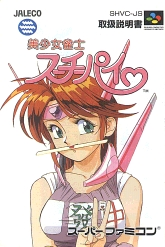 W
WIdol Janshi Suchie-Pai is a series of mahjong video games that have been developed and released by Jaleco on a variety of systems including arcade, PC, and video game consoles. The first game in the series was on the Super Famicom in 1993 as Bishōjo Janshi Suchie-Pai and was renamed Idol Janshi Suchie-Pai for its subsequent releases. Kenichi Sonoda did the character designs. There is also an anime OVA that is based on the game.
 W
WMomoko 120% is a 1986 arcade game by Jaleco released only in Japan. The game was originally intended to be an Urusei Yatsura game, but for an unknown reason the license was not obtained for the arcade version - while the characters were changed, Lum's Love Song, the first opening theme of the TV series, still loops throughout the game. However, the Family Computer port retained the license and was titled Urusei Yatsura: Lum's Wedding Bell. The game was re-released for Mobile Phones in Japan on February 28, 2006. Three mobile phone sequels were released, Momoko 1200%, Momoko 1200% in Machigai Sagashi, and Momoko no Kasei Bowling ~La Mars Cup~, were released in Japan only in 2006.
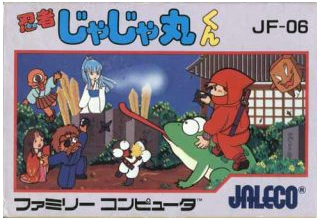 W
WNinja JaJaMaru-kun is an action game released in Japan on November 15, 1985 by Jaleco for the Famicom and in 1986 for the MSX. The MSX version was released in Europe as Ninja II, being marketed as a sequel to Ninja-kun: Majou no Bouken, a game that used the name Ninja for its European MSX release.
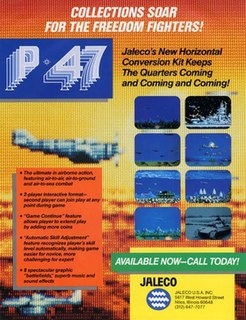 W
WP-47: The Phantom Fighter is a 1988 horizontally scrolling shooter arcade video game originally developed by NMK and published by Jaleco. Set during World War II, players control a Republic P-47 Thunderbolt fighter aircraft to face against the Nazis, who are occupying multiple countries around the world. Its gameplay involves destroying waves of enemies, picking up power-ups and new weapons, and destroying bosses. It ran on the Mega System 1 hardware.
 W
WRod Land, known in Japan as Yousei Monogatari Rod Land is a 1990 platform game originally developed and published in arcades by Jaleco.
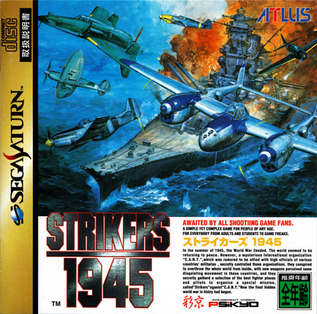 W
WStrikers 1945 (ストライカーズ1945), also known as Striker 1945, is a vertically scrolling shoot 'em up arcade game developed and published by Psikyo in 1995. In Japan, it was ported to the PlayStation and Sega Saturn by Atlus in 1996; later was also released as part of Psikyo Shooting Collection Vol. 1: Strikers 1945 I & II by Taito for the PlayStation 2. The game was followed by Strikers 1945 II in 1997, and Strikers 1945 III in 1999, as well as the second title remake called Strikers 1945 Plus.
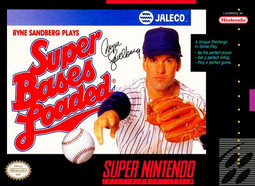 W
WSuper Bases Loaded is a baseball video game produced by Jaleco for the Super Nintendo Entertainment System in 1991. It is the fifth overall installment of the Bases Loaded series, and first installment of the secondary series for the Super NES. This game was originally released in Japan under the title Super Professional Baseball (スーパープロフェッショナルベースボール) in Japan.
 W
WWhomp 'Em, the North American version of the Japanese game Saiyūki World 2: Tenjōkai no Majin (1990), is a platform video game released on the NES in March 1991.
 W
WZero Gunner is a shoot 'em up developed by Psikyo and released in 1997. The arcade game allows for eight-way movement using a joystick and supports up to two players at a time. It was notable for its lock on targeting mechanic that allowed players to rotate around targets. The game was succeeded by a sequel, Zero Gunner 2 for the Sega NAOMI/Dreamcast.